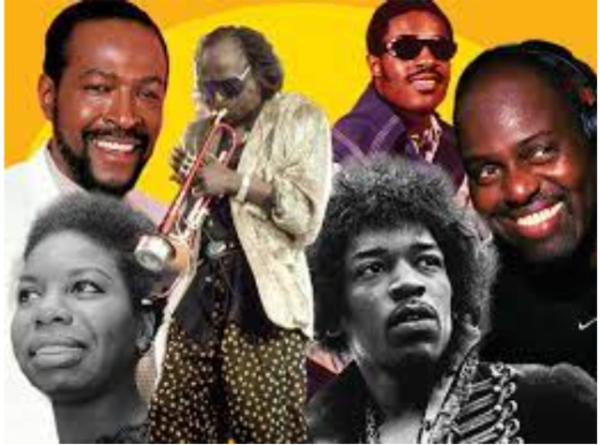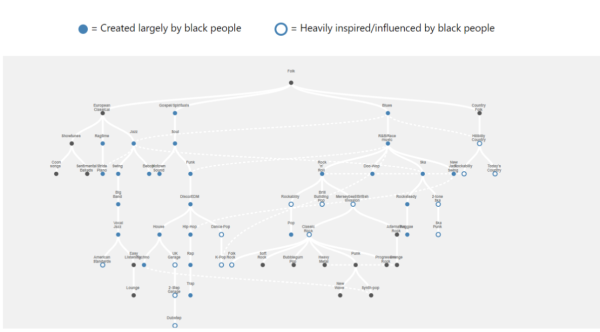 Picture via Dig!
Picture via Dig!
Music is one of the few crossroads in the world. It’s a universal language, even though it is spoken in different ways, everyone can learn it and resonate with it. A big part of this is the diversity found within much of its roots, specifically, how much of an influence Black people have had on it. It may not seem like a lot at first glance, but their influence can be seen throughout nearly every genre of music, and the musicians have become cultural icons, due to their songwriting, performances, and the statements they have made through their music.
Most music genres we listen to on a daily basis can be traced back to roots in the Folk genre, folk songs that people of ye olden days created throughout different parts of the world. From here, music splits off into many genres, which then create their own subgenres, and Black people have a massive influence on these genres as seen from the influence of this article, this chart from Vince Dixon.
 It can be seen in the Blues chains and the Gospel chains that Black people had a big influence on these genres, which led to things such as Soul, R&B, Rock n Roll, Funk, Jazz, and influence in other chains such as with Reggae, Hip-Hop and Rap, Pop, Techno, and some interesting influences like K-Pop and Country music. Let’s go into some of these chains more in-depth.
It can be seen in the Blues chains and the Gospel chains that Black people had a big influence on these genres, which led to things such as Soul, R&B, Rock n Roll, Funk, Jazz, and influence in other chains such as with Reggae, Hip-Hop and Rap, Pop, Techno, and some interesting influences like K-Pop and Country music. Let’s go into some of these chains more in-depth.
Starting with the Blues chain, this genre came about from a blend of spiritual music from African Americans and the culture enslaved people would keep and retain from Africa. Blues would soon become a popular genre, leading to many great stars of the genre, one such being Etta James, who is known for her signature style of songs, and how even in a genre dominated by similar songs, her songs would still stand out. From Blues, we have a cross between it and classical music, which brings us to Jazz.
Jazz is America’s claim to fame when it comes to creating genres, and Black people played a big part in its creation. The genre itself materialized in New Orleans, evolving from Ragtime, which mixed classical big band techniques with Creole-style music, according to an article from the National Museum of African American History and Culture. An influential Jazz artist is the well-known Louis Armstrong, who is known for his beautiful trumpet skills and his iconic voice, putting Jazz on the map worldwide.
Jazz and Blues together then help us to our next big genre, Rock n Roll. Created largely by Black people using the norms of Blues and Jazz, Rock became sentimental to the more rebellious teens of the time due to its high-energy performances from performers such as Elvis Presley, whose own music was inspired by those of Black people. Another performer is Jimi Hendrix, known for his experimentation with his guitar solos (fun fact, he plays left-handed, but instead of using a left-handed guitar, he uses a right-handed one upside down), these solos featured in songs like “Purple Haze,” which have become some of the most popular songs of the genre. Rock would take another turn of influence thanks to the “British Invasion” bands of the 1960s, but Rock soon became the basis of the modern Pop genre, helped in large by the artist known as the “King of Pop”, Michael Jackson. Known for his fame in The Jackson 5, when Jackson began his solo career, known for his catchy songs like “Thriller” and “Billie Jean,” as well as his signature dance moves, Jackson became one of the most influential artists of all time, as his album “Thriller” is the world’s best-selling album.
Let’s peer further into where Gospel music goes, beginning with the dual genres of Soul and R&B. R&B developed first from the Blues tree of music, infusing the already popular genre with things taken from Jazz, though it was seen just as “Black music” for a long time. That was before influential artists such as Sam Cooke emerged, he would release 29 songs that would chart on the Billboard Top 40 Pop singles. Cooke is also known for the song “A Change is Gonna Come,” written as a political commentary of the 1960s, leading to the song becoming a civil rights anthem.
Soul then develops much more out of the Gospel side of R&B, being much more lyric-focused than the instrumentals around it. Using much more church choir techniques than other genres, Soul became a genre known for its singing talents, with one of its biggest being Aretha Franklin. Franklin would be known for her immense singing talent, as well as her songs, her most popular being a cover of Otis Redding’s “Respect,” which became more popular than the original, and due to Franklin’s delivery and previous songs, would have the song become synonymous with the feminist movement.
These two genres helped create other genres much closer to modern music, one took the cultural elements of R&B and Rock to make Reggae and Ska, two closely related genres with influences from the Jamaican genre of Calypso, which has featured its own influential artists such as Bob Marley, known for his much more groove influenced music and his political songs that criticized politics in Jamaica. The other is created from Soul’s multiple evolutions from Funk and DJ music, Hip-Hop, leading to modern Rap. Created from club music when DJs would sing and create beats over the music, Hip-Hop truly took off in the late 1980s and early 1990s with The Notorious B.I.G, N.W.A, Snoop Dogg, and Run DMC, finding its audience in the youth of the generation like how Rock did in the 1950s and 1960s.
Modern music did take one thing from all of these genres, and that was how the power of music can bring ideas across like no other. Many of the artists listed above used their music as a platform to bring attention to things in Politics and everyday life. A BuzzFeed article collected significant examples from artists of the last 20-30 years, such as Lil Baby and supporting Black Lives Matter, artists like Alicia Keys, H.E.R., and Kendrick Lamar speaking about racial injustices and the deaths they cause, Usher and John Legend discussing police brutalities based on race, and Beyonce releasing a song celebrating the beauty and achievements of Black people in the wake of the death of George Floyd. All of these artists listed above took influence from the genres and pioneer artists that set the stage for what modern music has been able to do.
And it seems like this isn’t going to slow down soon, says Sidney Madden, a music journalist and podcast host for NPR who talks on her podcast about the relationship between music and culture, specifically Black culture. In an interview with NBC, she talks about the future of Black music and what it can do for change, “I see the future of Black music going where Black people are going, and that’s limitless. The more we use our voice to talk about things that matter, things that need to be changed…these are the things that need to be improved in our community, because if it’s going to be improved in our community, it’s going to be improved in America as a whole. That’s where we’re going. We’re going to more positions of power, influence and applicable change.”
Artist bios information taken from this article from School of Rock
Genre background information taken from the article by Vince Dixon
